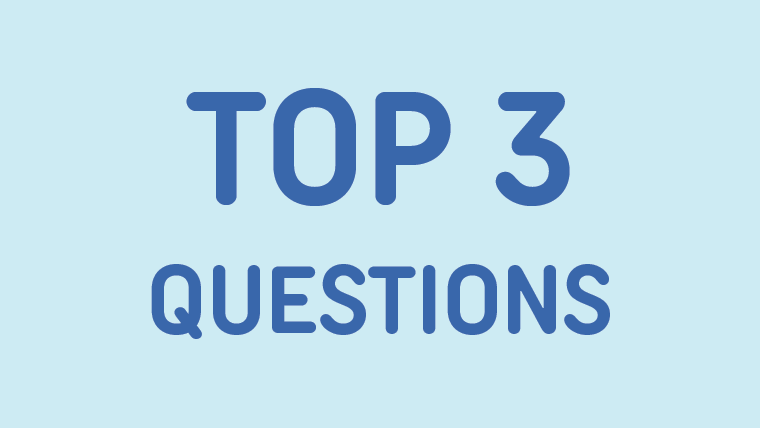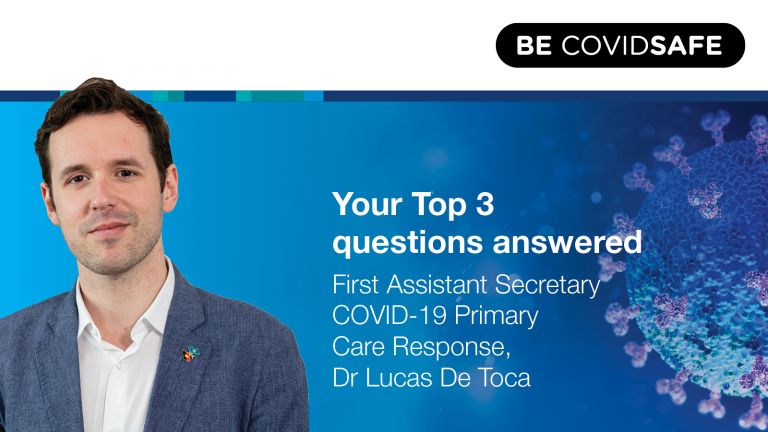
Good morning. My name is Dr Lucas De Toca. I lead the rollout of the vaccine through GPs for the Australian government.
Today we will be answering some of the questions you have been asking on our social media channels.
As usual, I am joined by Linda who will be doing AUSLAN interpreting.
[Speaks Indigenous language]
My shout out today goes to all the nurses, registered nurses working in general practice or state hubs, nurse practitioners, enrolled nurses, student nurses that are delivering the immense majority of vaccines around Australia. Thank you for all the work you do.
In fact, want to shout out nurse Michelle at the Winnunga Nimmityjah Aboriginal Health Service where I got my second dose of vaccine today. I am super excited. Even though it is not scientific because it takes a while to take effect, I feel like I am really protected today.
Today we're going to talk about treatments versus vaccine. And we're going to talk about children and the Delta variant and what we can do to protect kids while at the moment they are not eligible for the vaccine. And then how to find information about where to get an appointment. So let's get started.
In terms of treatment versus vaccine, you will have seen a lot of activity and talk at the moment about the Therapeutic Goods Administration, Australia's drug regulator, the TGA's provisional approval of a particular treatment for Covid, called Sotrovimab, bit of a mouthful,
So Sotrovimab is a specific novel therapeutic which is a monoclonal antibody, which is a type of drug that mimics what the antibodies, the small molecules that protect our body do, to treat a specific group of people who suffer from COVID-19 . This drug is particularly used for people 55 and older, who have some accompanying conditions.
[Sorry, it is important you don't touch your mask often.]
Who also have accompanying conditions such as lung disease, heart failure, diabetes, obesity, chronic kidney disease or moderate to severe asthma. It is a drug that is used for cases of moderate COVID-19 to prevent people from developing severe COVID-19 if they are at risk of doing so. It is used to treat a particular group of people, in a particular set of conditions. It is not a universal drug that can be used broadly for everyone who contracts COVID-19. That's why it's so important that even though it's really good we have this new therapeutic now available in Australia, that we still do what we can to prevent getting COVID. Which of course is practising COVIDSafe behaviours and getting a vaccine when you have the chance.
Either of the vaccines currently available in Australia, the AstraZeneca, which is now called Vaxzevria and the Pfizer COVID-19 vaccine which is now called Comirnaty, are incredibly effective at preventing severe disease, hospitalisation and death from COVID-19, including the Delta variant. And we're seeing it in the outbreak in Sydney and other parts of the country where the people in the ICU are exclusively unvaccinated or only partially vaccinated. The immense majority of people hospitalised are people who have not received the vaccine.
So the best way to prevent severe disease is to get vaccinated and continue to practice COVIDSafe behaviours. It's great we have a new treatment and I am sure there will be more developments in the coming months and there will be more and more tools in the arsenal to fight COVID-19. But the tools we have available now, including the two highly effective vaccines we have in Australia are your best bet to get protection.
Coincidentally we talk about protection through vaccines, and there are a lot of very understandable concerns about what happens with kids now that we are seeing that because the Delta variant is more transmissible at all ages we are seeing more and more cases in children and young people with COVID-19 compared to the waves last year.
There is still no evidence that the Delta variant of COVID-19 is more virulent or more severe for young people or children, but what we are seeing is because it is so much more transmissible we are seeing people of all ages more affected. That is why we are seeing more cases in children and young people than we did before.
At the moment most people under the age of 16 are not eligible for a COVID-19 vaccine. Everyone 16 years and over will become eligible from Monday next week, 30 August. But at the moment only children 12 to 15 years old with underlying medical conditions or those who are participants of the NDIS or who are Aboriginal or Torres Strait Islander or living in remote communities can access the vaccine.
So what do in the meantime with the other 12 - 15 year old children who are not eligible, or younger kids that at the moment there is no vaccine approved for them in Australia or in other parts of the world. The answer is multifaceted as usual. On one hand, getting people around the kids vaccinated, so any eligible adult or young person who can get the vaccine and can receive that protection will help to protect the children.
As we said, the vaccines are incredibly effective at preventing hospitalisation and severe disease but they also have an impact on transmission. We are still quantifying the exact nature of the impact, but we know that vaccinated people are less likely to get the disease altogether and seem to be less likely to transmit it when they have it. It's not full proof and there can still be transmission, but the odds are severely reduced.
So vaccinating the people around these kids, making sure every adult in the household has had a vaccine will help to protect them. In addition, continuing even now more than ever to practice COVIDSafe behaviours. Physical distancing, following public health directions and stay-at-home orders, of course, in areas where they apply, wearing a face mask if required, washing your hands frequently and practising good hygiene. Soap and water is best but if not then alcohol-based sanitiser with a proportion of 60% alcohol or higher.
And of course if you have even the mildest symptoms, no matter how mild they feel, stay at home, isolate, get a test and stay there until you get your result. Which incidentally I did on Monday I had the faintest sore throat, the kind of thing you would normally ignore. And I said, no, I have to isolate and get a test. I got my results within 24 hours and I could be reassured, once the symptoms went away, that it was all fine.
So keep practicing COVIDSafe behaviours, vaccinate people around the children, and then of course as more evidence emerges it is likely that in future we will have vaccines approved for kids.
In the context of expanding vaccine eligibility and people getting vaccinated, there are a lot of questions about, how do I get information about where to get my vaccine appointment, and the answer as usual is always go to the official government channels. Health.gov.au has the Vaccine Eligibility Checker and the Vaccine Clinic Finder that has all the clinics across, including general practices, community pharmacies, Aboriginal Health Services, Commonwealth vaccination clinics and state and territory vaccination centres.
So, if you are looking for a centralised view of all the vaccination centres available including with links on how to book, or phone numbers for those who don't have online booking, go to the Vaccine Clinic Finder on health.gov.au.
And more and more appointments become available every day. We have over 8000 primary care sites, pharmacies, GPs, Aboriginal health service available and more and more of them are getting access to Pfizer and in addition to AstraZeneca. And in the very shortly in the future the Moderna vaccine. If you can't find an appointment near you, keep checking because every day more appointments are becoming available.
That's all we have for today. Thank you so much for submitting your questions and watching this segment. Thank you for staying COVIDSafe and we will see you next time.
Top 3 questions
- If there are treatments available for COVID-19, why should I get vaccinated?
- As my child is more likely to spread the highly contagious Delta variant, what steps/behaviours will help slow the spread?
- Where can I get credible information about potential COVID-19 vaccine wait times?







